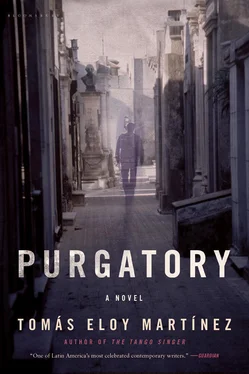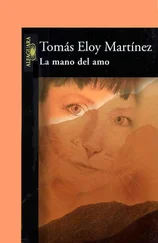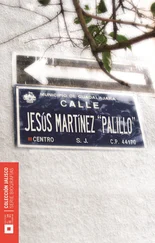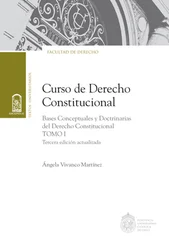Tomás Eloy Martínez - Purgatory
Здесь есть возможность читать онлайн «Tomás Eloy Martínez - Purgatory» весь текст электронной книги совершенно бесплатно (целиком полную версию без сокращений). В некоторых случаях можно слушать аудио, скачать через торрент в формате fb2 и присутствует краткое содержание. Год выпуска: 2008, Издательство: Publishing PLC, Жанр: Современная проза, на английском языке. Описание произведения, (предисловие) а так же отзывы посетителей доступны на портале библиотеки ЛибКат.
- Название:Purgatory
- Автор:
- Издательство:Publishing PLC
- Жанр:
- Год:2008
- ISBN:нет данных
- Рейтинг книги:5 / 5. Голосов: 1
-
Избранное:Добавить в избранное
- Отзывы:
-
Ваша оценка:
- 100
- 1
- 2
- 3
- 4
- 5
Purgatory: краткое содержание, описание и аннотация
Предлагаем к чтению аннотацию, описание, краткое содержание или предисловие (зависит от того, что написал сам автор книги «Purgatory»). Если вы не нашли необходимую информацию о книге — напишите в комментариях, мы постараемся отыскать её.
"Purgatory" narrates the anxiety of the love lost and then found in a magnificent reconstruction of the sinister events that went down in the time of the regime in Argentina.
Purgatory — читать онлайн бесплатно полную книгу (весь текст) целиком
Ниже представлен текст книги, разбитый по страницам. Система сохранения места последней прочитанной страницы, позволяет с удобством читать онлайн бесплатно книгу «Purgatory», без необходимости каждый раз заново искать на чём Вы остановились. Поставьте закладку, и сможете в любой момент перейти на страницу, на которой закончили чтение.
Интервал:
Закладка:
I was describing her, bent over her drawing table, over the half-finished map of the eruv , when she called to ask me if it was Simón reflected in her mirror. I already said, I think, that I saw only myself and the photo of Simón as a young man on the nightstand behind me. For more than a week now, I have made no attempt to find Emilia. Sooner or later, I feel sure, she will call because the memories I carry within me are her memories too, and she will ask me to leave them where they are. Before I lost her, I thought I saw a light on in her apartment and I rang the doorbell. I must have been mistaken, because no one answered. I looked again and the lights were off.
Sunday night, Emilia orders in Japanese food again and she and Simón eat in silence. On the table is a bottle of sake she bought at Pino’s and, without realising, the two of them drink half the bottle. The delicate rice wine enfolds them in a giddiness like marijuana, it is a pleasure Emilia adopted from two late films by Ozu that she watched on DVD. Just as Ozu’s women anaesthetise their troubles with sake, Emilia has spent the day letting go her remaining troubles, dealing with the last one on her computer. Before dinner, she sent a brief note to her head of Human Resources at Hammond. ‘I need to be out of the office for a few days,’ it said, and at the bottom, ‘Personal reasons.’ She is no longer able to bear the routine of work. She does not want to go back to grid squares of maps, she cannot bear ever to leave this person who has come back to take her away. She has suffered more than she can bear. The world is cruel to those who love, they say. It distracts them, deflects them from the love that is the true centre of life. Why miss out on love and turn towards something else? What to do with all the wasted love that has gone unlived? Now, it does not matter to her to know what happens next. All that matters is that she does not move from the point she has reached. I’m happy, she says to herself over and over, I could go to the depths, the heights of this happiness, but not beyond it.
Simón is very pale. She sees a languid smile play on his lips. It worries Emilia that the smile came to his face just as dusk is blotting out the shape of things and she will lose the image, perhaps forever. This is the trouble with love, she thinks: that cherished expressions disappear, looks which, in memories, could be those of anyone. She gets up and puts on one of Jarrett’s concerts. The volume is turned down very low and she would like Simón to touch her. He has been affectionate to her, though she has noticed a certain reserve in his tenderness. Their lovemaking has been better than it ever was; love between them has always been easy, what has been difficult is tenderness. Thinking about it, perhaps this is the price to be paid for the remoteness she too felt in their first months of marriage. Only in Tucumán was she able to surrender herself, to realise that when his body entered into hers, she also entered into his. That one night was also the last: until yesterday. The solitary ecstasy of the past has been repeated and she never wants it to end, she wants to exhaust herself with love as though life were this and only this, the endless orgasm she has dreamed about for thirty years. Let him touch her, then. Simón is now sitting on the bed and she lays her head on his shoulder. ‘Touch me, amor , touch me,’ she says.
But Simón talks about other things. ‘When I was far from you I thought I would find you inside a map.’ Emilia interrupts him: ‘This might sound strange, but I thought the same thing.’ Simón: ‘I saw you standing in the map. I didn’t know where you were because the vectors had been erased. It was a desert with no lines.’ And Emilia: ‘In that case it wasn’t a map.’ Simón: ‘Maybe it wasn’t, but that’s where you were.’ And Emilia: ‘If it was a map with no landmarks, you could have left a trail of names, drawn trees for reference, I would have found you. Once, in Mexico, I followed a trail of white pebbles convinced that, like in Hansel and Gretel , when I came to the last one, I would find you. In Caracas, I named all the streets in a neighbourhood so you could find me: Iván el Cobero, Coño Verde. At the top of the hill was a small square. I called it Simón Yemilia. The neighbours thought I named it Simón after Simón Bolivar; I added Yemilia because a lot of girls around there are called Yemila, Yajaira, Yamila, but I knew you would know I meant Simón y Emilia , I knew that if you were ever there, ever looked at a new map of Caracas, you would be able to find me. Why don’t you touch me?’
Jarrett’s music circles around the same clusters of notes, sometimes lingering on a single note, and outside, the night itself has stopped moving; only inside Emilia, as in a dark heart of a volcano, life still ebbs and flows.
She can’t remember Simón ever fucking her the way he is fucking her now. Her body is ablaze, she arches herself, raises her body so he can penetrate all the way to her throat, she licks him, devours him, and what she feels is so intense, so overpowering, that she feels coursing from her tongue the foam from the tongue with which he kisses her. Emilia soars so high that Simón’s fires reach deeper than her body, they are fires of pure sex, flames that come and go leaving no ashes. By now she has lost count of how many times she’s come, they’ve climaxed, she’s orgasmed, how do they say it in other languages, ancora, more, encore, ainda mas , don’t go, querido mío , don’t leave. On and on until the first breath of morning seeps through the window, on and on until she can’t go on any more and clutches the pillow wet with tears.
The Jarrett concert stays with her all night. The CD ends but she does not notice. She knows the slow final cadences by heart and so the melody slips unnoticed towards silence. She hugs Simón to her, fearful that reality will fade out like the music. The room is still dark, the faint brightness she saw when she woke disappears. Perhaps we can’t see the sun, she thinks. A dirty grey day like most of the days this autumn. She doesn’t know whether or not to get up. She allows herself to be carried along by the joy of knowing that he is sleeping here, in the room, and that he will not leave her again to waste her life in the maps at Hammond. Why wake him? This body lying next to her is the only map she needs to get her bearings in time. And thinking about it, what need has she of time when time has folded in on itself and now fits inside the body of her beloved. When she first set out to look for him she could not have imagined that there could have been so many circles in her purgatory, nor that when she reached one another would appear above it, and then another. Her eternal noon was an everlasting purgatory.
Now, I am the one wondering where Emilia has gone. Nancy Frears phoned the police, who are thrilled to be presented with a mystery in this town without mysteries. Two officers accompanied by the chief of police in person broke down the door of her North 4th Avenue apartment and found not a living soul. The bed was made, the books and CDs neatly organised, the hi-fi and the computer had not even been unplugged. There were no signs of a break-in or a robbery. The only conspicuous detail was that Emilia had not taken out the garbage bag in the kitchen and by now it was beginning to smell. On the table were the remains of some sushi, a seaweed salad and some Chinese fortune cookies. Nancy phoned Chela, but, according to her answering machine, the Echarri family were out of the country. I’m the last person to have seen Emilia and the police asked me to come in and make a statement. As I explained, a fat cop took notes, stopping from time to time to eat the half-finished pizza oozing grease all over the cardboard delivery box. The officer wanted to know if Emilia had been suicidal, suffered from some terminal illness or mentioned that she might be going on holiday. The interview lasted half an hour, and before he handed me the statement to sign, he asked if there was anything else I could think of that might be helpful. I was surprised to hear myself telling him that thirty years ago in my country many people disappeared without leaving a trace and that Emilia’s husband had been one of the disappeared. ‘She never gave up hope of finding him again,’ I said. ‘She could never bring herself to accept that he might be dead.’ ‘What about you, what do you think?’ asked the officer. ‘I believe he’s dead. Emilia’s not the only person to hope that someone she loves will come back from the dead; there are thousands like her, clinging to an illusion. Imagine the pain of not knowing where your daughter is, not knowing who took her. And if she were dead, imagine the desolation of not knowing in what dark corner of the world her body is.’ ‘In this country, it is the job of the police to find out what happened,’ said the officer. ‘We are paid by the state to do just that. This woman’s disappearance might be a crime, a kidnapping, she might have committed suicide, she could have gone away to join a sect. We can rule out kidnapping, since it’s been several days and there’s been no ransom demand. We can rule out the idea that she’s been taken by gangsters running a prostitution ring, since, quite frankly, the woman is too old. Also she has no priors and there’s no reason to suspect she was a drug mule or involved in trafficking. She has a perfect résumé, no offences, no problems at work, she got on well with her neighbours. It makes no sense,’ the officer went on. ‘Here, people don’t just disappear into thin air. Give it a week or two and we’ll find out what happened.’ ‘It doesn’t always work out that way,’ I said. ‘You see photos of missing people on milk cartons all the time, kids, old people.’ ‘Most of them have mental health problems,’ insisted the policeman. I said goodbye, left a card with my details on his desk and asked him to get in touch if they found out anything.
Читать дальшеИнтервал:
Закладка:
Похожие книги на «Purgatory»
Представляем Вашему вниманию похожие книги на «Purgatory» списком для выбора. Мы отобрали схожую по названию и смыслу литературу в надежде предоставить читателям больше вариантов отыскать новые, интересные, ещё непрочитанные произведения.
Обсуждение, отзывы о книге «Purgatory» и просто собственные мнения читателей. Оставьте ваши комментарии, напишите, что Вы думаете о произведении, его смысле или главных героях. Укажите что конкретно понравилось, а что нет, и почему Вы так считаете.












